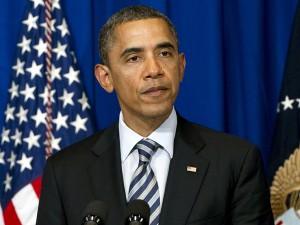North Korea defies US, to go ahead with rocket launch
SEOUL—North Korea on Tuesday vowed to go ahead with its planned rocket launch, snubbing demands from US President Barack Obama and other world leaders attending a summit in Seoul on combating nuclear terrorism.
In Manila, Philippine labor officials said they were ready to evacuate thousands of Filipinos working in South Korea if the situation deteriorated into a full-blown crisis.
North Korea’s plan to launch a long-range rocket next month overshadowed the 53-nation summit, which focused on the threat of uranium and other nuclear material falling into the hands of terrorists.
Obama devoted much of his visit to South Korea to its wayward neighbor, denouncing the planned launch, while emphasizing the United States was not hostile to the North Korean people. The West says the launch is a disguised test of a long-range missile designed to reach the American mainland.
Challenge to Obama
North Korea on Tuesday responded by saying it would go ahead with what it called a peaceful satellite launch, saying every nation had this right, and called on Obama to drop his “confrontational mind-set.”
“The US head of state said he had no hostile intention toward us,” said a Pyongyang foreign ministry spokesperson.
“But if that remark is genuine, he should abandon the confrontational mind-set that tries to block us, and should have the courage to admit that we have as much right to launch our satellite as other countries do,” the spokesperson added.
The North said it would judge whether Obama’s remarks were genuine “or just another hypocrisy,” depending on whether his country applies a double standard to the launch.
Communique
The summit communique was light on specifics on how to reduce the risk of atomic materials falling into bad hands, loosely calling for all vulnerable material to be secured in four years.
The world’s biggest nuclear concerns, those surrounding the weapons programs of North Korea and Iran, were not on the summit agenda.
The United States, Japan, South Korea and other countries say the planned North Korean launch would in fact be a long-range missile test, banned under UN resolutions and breaching a US-North Korean deal last month.
Chinese concern
Chinese President Hu Jintao, whose country is North Korea’s sole major ally, also expressed serious concern at Pyongyang’s plan during a meeting with Obama.
On the summit’s final day, Obama was focused on the nuclear threat from “nonstate actors” and not the nuclear-armed North. “The security of the world depends on the actions that we take,” he said in a speech.
Obama in 2009 declared his vision of a world without nuclear weapons.
Many ‘bad actors’
“We are fulfilling the commitments we made in Washington. As a result, more of the world’s nuclear material will never fall into the hands of terrorists who would gladly use it against us,” Obama said.
“What’s also undeniable is that the threat remains. There are still too many bad actors in search of these dangerous materials and these dangerous materials are still vulnerable in too many places,” he added.
“It would not take much—just a handful or so of these materials—to kill hundreds of thousands of innocent people.”
An Interpol representative told the session there were “lots of evidence” that the extremist network al-Qaeda would use nuclear weapons if it had them, according to German delegation sources. Interpol said there were 3,000 cases in 119 countries in which nuclear material had gone missing.
‘Dirty bomb’
South Korean President Lee Myung-bak said the proliferation of nuclear weapons and the threat of nuclear terrorism “pose a grave challenge” to peace.
The world still has some 1,600 tons of highly enriched uranium (HEU) and 500 tons of plutonium, enough to make more than 100,000 nuclear weapons, Lee said.
The leaders also tackled the threat posed by loosely guarded radioactive material in hospitals and other sites, which could be combined with high explosives to make a “dirty bomb.”
In the communique, the leaders called for steps to minimize civilian use of HEU and for safeguarding world stockpiles of HEU and plutonium. They urged tightening the security of radioactive material that could be used to produce “dirty” bombs.
Material that can be used to make nuclear bombs is stored in scores of buildings spread across dozens of countries, experts say. If even a fraction of it fell into the hands of terrorists, it could be disastrous.
“Nuclear terrorism continues to be one of the most challenging threats to international security,” the leaders said. “Defeating this threat requires strong national measures and international cooperation.”
France, Belgium and the Netherlands—top suppliers of medical isotope—announced plans to phase out the use of HEU in the production process, under a deal with the United States.
Japan steered off the summit agenda to hit out at North Korea’s planned launch. Japanese Prime Minister Yoshihiko Noda ignored protocol and urged the international community to demand that North Korea exercise self-restraint.
North Korea says the launch planned for between April 12 and 16 will carry a weather satellite into orbit. Reports from Reuters, AFP and AP
